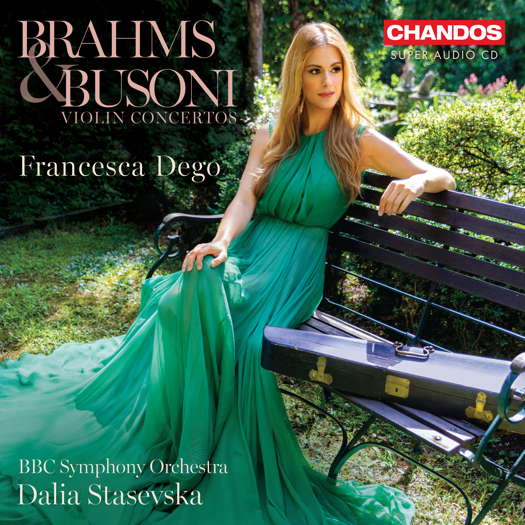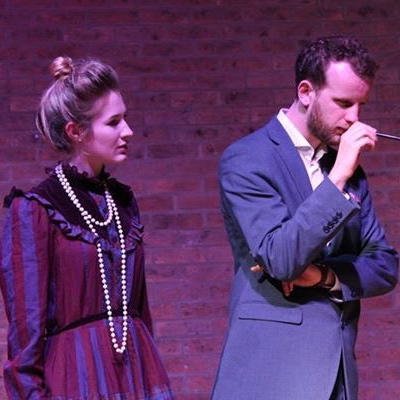 DISCUSSION: What is a work? John Dante Prevedini leads a discussion about The performing artist as co-creator, including contributions from Halida Dinova, Yekaterina Lebedeva, Béla Hartmann, David Arditti and Stephen Francis Vasta.
DISCUSSION: What is a work? John Dante Prevedini leads a discussion about The performing artist as co-creator, including contributions from Halida Dinova, Yekaterina Lebedeva, Béla Hartmann, David Arditti and Stephen Francis Vasta.

Neither Romantic nor Modern
GERALD FENECH recommends Francesca Dego's new recording of violin concertos by Brahms and Busoni
'... splendidly recorded and annotated ...'
Ferruccio Busoni (1866-1924), the Italo-German composer, is all over the map of early musical modernism. A touring virtuoso, before he was a teenager, he made Berlin his primary home but had brief stints in Leipzig, Moscow, Boston, Zurich and Paris. In each case he made his mark on local culture as performer, pedagogue and philosopher.
The 1897 Violin Concerto, his only work in this genre, was composed during the early Berlin years and dedicated to violinist Henri Petri, father of pianist Egon Petri. Given Busoni's centrality to so many important ideas and figures in musical culture, it is ironic that his own musical style is so hard to pin down.
Listen — Busoni: Allegro moderato (Violin Concerto)
(CHSA 5333 track 1, 4:56-5:37) ℗ 2024 Chandos Records :
As musicologist Christopher Hailey puts it:
Busoni was a classicist; his musical models were first and foremost Bach and Mozart, his highest priorities clarity of form and a limpid contrapuntal texture.
Yet it was Busoni who proclaimed:
Music was born free and to win freedom is its destiny.
The new classicism he argued for shared theoretical space with arguments for an expansion of the chromatic scale, for electronic instruments, and for more freedom in the treatment of form and musical development. In keeping with these seeming paradoxes, his Violin Concerto in D, Op 35a, is a work that is easier to define for what it doesn't do than what it does. It is neither romantic nor modern; it neither breaks new ground nor clings to the past. It acknowledges tradition but with a modern consciousness. Indeed, this concerto lays bare all the composer's personal preoccupations: the virtuoso's touch in the work's soaring passages and idiomatic gestures; the classicist's in its sense of proportion and internal logic. The piece only lasts twenty-two minutes but, in spite of its brevity, this concerto is full of lyricism and appealing melodies and is a work that leaves one the better for having heard it, especially when it is performed with such conviction as on this recording by Francesca Dego.
Listen — Busoni: Quasi andante (Violin Concerto)
(CHSA 5333 track 2, 4:02-4:55) ℗ 2024 Chandos Records :
1 January 1879 was a momentous day for Johannes Brahms (1833-1897). Why, may one ask? Indeed, this was the date when the composer's only Violin Concerto was premiered by his virtuoso friend Joseph Joachim, who was also the dedicatee and who wrote the cadenza that is still played today by many violinists. Never fond of having to identify with the armies of piano virtuosos who toured Europe and composed flashy variations on tunes from Mozart's and Verdi's operas, he decided to at least have a small break from his piano works and try his hand at the violin. As one can guess, the Violin Concerto in D, Op 77, is modelled on Beethoven's piece, and he made this doubly plain by choosing the same key and composing a long, lyrical first movement in full classical sonata form.
Listen — Brahms: Allegro non troppo (Violin Concerto)
(CHSA 5333 track 4, 11:03-11:57) ℗ 2024 Chandos Records :
Perhaps we should be surprised that Brahms composed a violin concerto at all, but when the composer met for the first time Joachim, the first important musician he came across, the two struck a firm friendship that lasted over forty years. Brahms knew that at some time during his career he would have to compose a violin concerto for his great mentor, but this only came about some twenty-five years after their first meeting. Brahms worked closely with Joachim in fashioning the solo part, as he wanted the concerto to be a test of the player's technique and musicianship and to be free of any suspicion of unmotivated display.
Although display is perfectly desirable in a concerto, it still remains for us to decide whether the soloist's leaps, arpeggios, double-stops and passage-work are intrinsic to the work or not. Whatever the case, Brahms' Violin Concerto is a great tour de force full of exquisite lyrical passages mixed with impressive passionate outbursts and animated rhapsodic tempos.
Francesca Dego delivers superb performances full of fabulous dexterity that generate power and excitement from beginning to end. The Brahms in particular is simply irresistible, with Dego's absolute mastery of the piece highlighting all the genius of Brahms' inexhaustible orchestral ingenuity.
Listen — Brahms: Allegro giocoso, ma non troppo vivace (Violin Concerto)
(CHSA 5333 track 6, 7:15-7:58) ℗ 2024 Chandos Records :
These are two contrasting concertos, splendidly recorded and annotated, which should give many hours of pleasure. Recommended most heartily, if only to give yourself a chance of making an acquaintance with the Busoni work.
Copyright © 7 March 2024
Gerald Fenech,
Gzira, Malta




